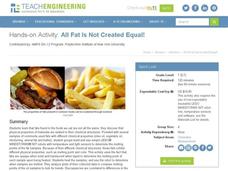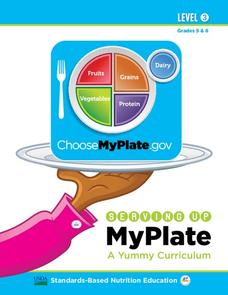Mascil Project
Molecular Gastronomy - Science in the Kitchen
Some say cooking is an art—and a science! Scholars scope out the savory subject of molecular gastronomy with a series of related activities. The teacher's guide contains printable worksheets and helpful tips for implementing the...
University of Georgia
Energy Content of Foods
Why do athletes load up on carbohydrates the evening before a competition? The lesson helps answer this question as it relates the type of food to the amount of energy it contains. After a discussion, scholars perform an experiment...
Curated OER
Review of Ionic and Covalent Compounds and Transitioning from Ionic to Covalent Compounds
Here is a unique assigment: compare and contrast ionic and covalent compounds in an extensive data table and then analyze Lewis dot structures in antoher. Three columns are to befilled in: "characteristic or feature," "applies to ionic...
Curated OER
Healthy Snacks Project Lesson
After learning why it is important to limit salt, fat, and sugar in their diets, divide your class into pairs or groups to complete this project. Each group will create two charts: unhealthy and healthy foods. They will cut out food...
Nemours KidsHealth
Healthy Snacking: Quiz (Grades 9-12)
Test your learners' healthy snacking know-how with this quiz. This quiz is made up of 10 questions about how to choose a healthy snack. Topics include food labels, carbohydrates, healthy snack choices, and high-fat foods. Use this quiz...
Nemours KidsHealth
Healthy Snacking: Snack Report Card
In this healthy snacking worksheet, high schoolers complete a "report card" for snacks found at their school. They include the type of snack, the grams of carbohydrates, sugar, protein, and fat, the calories, the vitamins, and the grade...
American Chemical Society
Colors on the Mooove!
It does a mind good! Learners experiment with a combination of food coloring, detergent, and milk. They observe how the food coloring reacts with the different liquid combinations and relate their observations to the charges on the fat,...
Nemours KidsHealth
Food Labels: Grades 6-8
With the help of two activities, scholars discover what's in their favorite foods by reading nutrition labels. Activity one challenges participants to write a letter to a fictional peer about the importance of making healthy choices....
Nemours KidsHealth
School Lunch: Grades 9-12
Go! Slow! Whoa! As part of a study of the nutritional value of foods available on the school campus, groups label those that are fine anytime as "Go" foods. Those that are okay a few times a week get the "Slow" label while those...
Nemours KidsHealth
Healthy Snacking: Grades 9-12
Snacks—even the word can conger up a hunger. Rapidly growing teens, especially, rely on snacks to get them from one meal to the next. After reading a series of articles about nutrition and healthy snack choices, pupils fill out a report...
Nemours KidsHealth
Food Labels: Grades 9-12
Check the label! That's the big idea in a instructional activity about using the nutrition facts on food labels rather than advertising hype to make healthy choices about what to eat. After reading background articles and learning how to...
Biology in Motion
Fat Digestion and Bile
Understand the role of bile in fat digestion with the help of a simple animation. The short interactive explains why fats are difficult to break down and how bile assists lipase in maintaining a healthy system.
Howard Hughes Medical Institute
How the Body Uses Fat
Not all fat is bad—eating good fats actually helps with weight loss. Learn how the body uses fat through a 27-slide presentation that breaks down the path fat takes from entering to exiting the body. Understanding why fat is helpful and...
Howard Hughes Medical Institute
Molecular Structure of Fat
Bad fat, good fat, trans fat, food fat—are all fats created equal? Get to the bottom of the types of fat with a well-crafted presentation. The resource covers adipose tissue, lipids, trans fats, and many other substances that fall under...
Nuffield Foundation
Investigating the Effect of Temperature on the Activity of Lipase
How does temperature affect lipase activity? Young scholars conduct an experiment to collect data on the interaction of lipase at different temperatures. They add lipase to a solution of milk, sodium carbonate, and phenolphthalein and...
Teach Engineering
All Fats Are Not Created Equal
Apply robotics to connect physical properties to chemical properties. Future engineers use robots to determine the melting points of various fats and oils. The robots can do this by measuring the translucency of the fats as they heat up.
University of Georgia
The Power of Peanuts
Measure the amount of energy in a peanut by igniting a chemical reaction. Classes use a laboratory setup to burn a peanut and measure the amount of heat it releases through a temperature analysis. They calculate the number of Joules of...
Science Geek
Basic Biochemistry - Carbohydrate, Protein and Fat
You are what you eat, right down to your molecular structure. A hearty presentation begins with the two types of carbohydrates, simple and complex. Then it details proteins and amino acids. It ends by reviewing the three types of...
Cooking Matters
Cooking Matters: For Chefs and Kids
Get your scholars cooking with a collection of activities that pairs the class to a community chef, promotes healthy snacking and drinking, and explores fruits and vegetables. Lower elementary learners...
US Department of Agriculture
Serving Up My Plate
Within three nutrition-themed, inquiry-based learning opportunities, pupils take notice of their eating habits; delve deep into the five food groups, gain experience in planning meals, participate in a taste test, and explore ads...
Curated OER
The Art of Soap Making
Here is a nice, clean wrap-up activity for your chemistry class when they are studying chemical reactions . They experiment with different oils to make soap. To make it more fun, they are to imagine that they are part of a soap testing...
Curated OER
Food Fat
High schoolers evaluate snack foods based on calories and fat. In small groups, they use this information to make informed and wise food choices. Students graphically represent the fat in a food by measuring the equivalent of the food...
Curated OER
The Chemical Building Blocks of Life
Amateur biologists examine the macromolecules that are foundational to life: proteins, lipids, and carbohydrates. This worksheet is composed of five pages of questions and plenty of space to write answers. Learners will explore...
Primary Resources
Eating a Balanced Diet
A perky presentation provides an overview of what comprises a balanced diet. Viewers discover why water is vital to our health, what the macro-nutrients are and what they provide, and how calcium is important to bones and teeth. The...

























